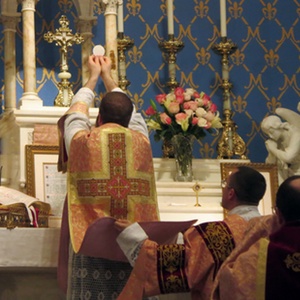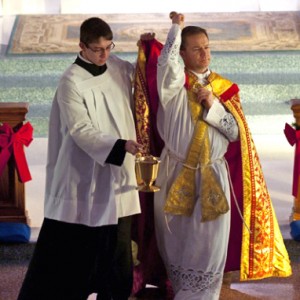 In the Extraordinary Form, there are two primary types of Masses celebrated: the spoken or “Low” Mass, and the “Sung” Mass (sometimes referred to as High Mass).
In the Extraordinary Form, there are two primary types of Masses celebrated: the spoken or “Low” Mass, and the “Sung” Mass (sometimes referred to as High Mass).
Low Mass is celebrated by a priest assisted by one or more altar boys. The prayers are spoken (in Latin), and much of the Mass of the Faithful (after the offertory) is almost inaudible, in imitation of the ancient Jewish liturgies given by God to Moses, and emphasizing the fact that we are faced with a profound mystery.
During Low Mass, only the altar servers respond to the priest. The priest alone says the Pater Noster prayer (Our Father), and only he assumes the Orans prayer position (hands extended and held shoulder-width apart).
 Sung Mass is normally celebrated once a week, at 9:00 A.M. on Sundays, as well as Holy Days of Obligation and other special feasts throughout the year. Sung Mass includes the Asperges before Mass, in which the priest sprinkles the congregation with Holy Water as part of the opening liturgical ceremony. Sung Mass is so called because many of the prayers of the Mass are sung by the priest, choir, or schola. Sung Mass also usually employs the use of incense.
Sung Mass is normally celebrated once a week, at 9:00 A.M. on Sundays, as well as Holy Days of Obligation and other special feasts throughout the year. Sung Mass includes the Asperges before Mass, in which the priest sprinkles the congregation with Holy Water as part of the opening liturgical ceremony. Sung Mass is so called because many of the prayers of the Mass are sung by the priest, choir, or schola. Sung Mass also usually employs the use of incense.
At Sung Mass, the faithful chant the Kyrie, Gloria, Credo, Sanctus and Agnus Dei with the Schola (choir). The congregation also responds to the Priest in chant during multiple points during the Mass.
Solemn Mass (also known as a Solemn High Mass), a type of Sung mass, is the full ceremonial form of the Tridentine Mass, celebrated by a priest with a deacon and a subdeacon, requiring most of the parts of the Mass to be sung, and the use of incense. The parts assigned to the deacon and subdeacon are often done by priests in vestments proper to those roles. (source)